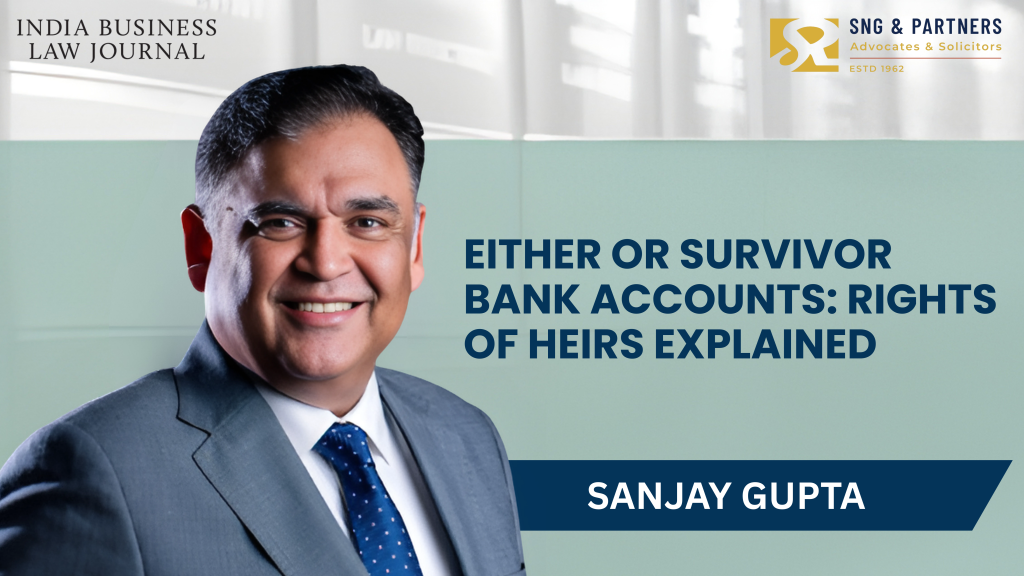by Navneet Gupta, Partner and Pankaj Bajpai, Senior Associates at SNG & Partners
A. The term “front running” is defined under SEBI’s Circular no. CIR/EFD/1/2012 dated May 25, 2012 as under:
Front-running; for the purpose of this circular, front running means usage of non-public information to directly or indirectly, buy or sell securities or enter into options or futures contracts, in advance of a substantial order, on an impending transaction, in the same or related securities or futures or options contracts, in anticipation that when the information becomes public; the price of such securities or contracts may change.
B. The Hon’ble Supreme Court in the matter of in the matter of SEBI Vs. Shri Kanaiyalal Baldevbhai Patel and ors. [(2017) 15 SCC 1] observed as under:
In actuality, front-running is more complicated than these definitions suggest. It comprises of at least three forms of conduct. They are:
(1) Trading by third parties who are tipped on an impending block trade (“tippee” trading);
(2) Transactions in which the owner or purchaser of the block trade himself engages in the offsetting futures or options transaction as a means of “hedging” against price fluctuations caused by the block transaction (“self-front-running”); and
(3) Transactions where a intermediary with knowledge of an impending customer block order trades ahead of that order for the intermediary’s own profit (“trading ahead”)….”
C. Thus the following may be listed as ingredients to classify a trading activity as front running:
1. There is existence of an information regarding a substantial order on behalf of a client in a particular security, and such information is not available publicly;
2. Based on such information about impending orders in various scrips, order (s) (“FR Order”) is/are placed in the account of Front Runner (“FR”) in the securities in advance of the order (s) of the client. The FR order is placed in alignment with the order of the client i.e. if the client is going to buy securities, the FR order will also be of buying shares and vice versa.
3. The placement of the buy orders of the client generally causes the prices of the scrip to move upward or the sell orders of the client generally causes the price to move downwards.
4. During the time of placement of orders of the client, the FR squares of his position and earns the difference in price which is majorly attributable to the orders of the client.
D. Thus when client is going to buy shares, the FR follows a pattern of Buy-Buy–Sell (BBS”), where first Buy trades are carried out in the account of Front Runner; second set of Buy trades are carried out in the account of the client generally causing the prices to move upward and the third set of Sell trades are squaring off the position by Front Runner. Similarly, in Sell-Sell-Buy (“SSB”) pattern, the FR first short sells the shares before sell orders of the client are placed in the system and eventually buys the shares and earns profit.
Front Running by Ketan Parekh
As per SEBI order dated 2.1.2025 available in public domain, Ketan Parekh had allegedly obtained non-public information (“NPI”) of a major US fund’s (referred to as the Big Client in SEBI Order) trades from Singapore-based Rohit Salgaocar, who had an agreement to refer trades of that fund to Motilal Oswal Financial Services Ltd. and Nuvama Wealth Management Ltd. Ketan Parekh then passed on the information to his associates to front run the trades, either directly or through facilitators, who took positions in various scrips ahead of the order of the Big Client in those scrips
In this case, the FRs have modified the usual modus operandi of front running and, thus, have adopted a novel approach to benefit from the NPI with respect to substantial impending transaction of the Big Client. After the traditional BBS and SSB trading strategy, the prices in a scrip generally retrace to normal levels after the big trades get executed. A person equipped with the knowledge of the impending big order and knowing how the prices in the scrip behave post such big trades can undertake NPI-based trades by matching quantities with client as well as by taking positions in larger quantities than the position of client and then squaring off their excess position when the prices in the scrip retrace to normal levels. In both the instances, FR can make huge profits in a short span of time.
The aforesaid strategies are nothing but an extended form of front-running since the orders are placed in securities by FRs, while directly or indirectly in possession of information that is not publicly available, regarding a substantial impending transaction in that securities, its underlying securities or its derivative. The scam conducted during January 1, 2021 to June 20, 2023, came to notice of SEBI on account of unusual trading patterns linked to Big Client.
SEBI employed advanced technology, including algorithms, data analytics, and communication surveillance, to detect front-running. Detailed analysis by SEBI revealed the recurrent matching of the scrip, price, quantity and timing of trades between the client and FRs which would not have been possible unless FRs were in possession of Non-Public Information (“NPI”) or NPI-based trading instructions relating to impending orders of the client in various scrips.
This investigation unearthed a prima facie case of fraudulent and unfair trade practice carried out by Ketan Parekh and his associates (“Noticees”) which resulted in accrual of unlawful gains of INR 65,77,11,547 (INR 38.70 crores by FRs + INR 27.07 crore).
The SEBI is thus of the prima facie opinion that the violation of clauses (a), (b), (c), (e) of section 12 A and clauses (a), (b), (c), (d) of regulation 3, sub-regulation (1) of regulation 4, clause (q) of sub-regulation (2) of regulation 4 of the SEBI (Prohibition of Fraudulent and Unfair Trade Practices) Regulations, 2003 (“PFUTP Regulations”) have been committed.
As four of the FRs, in whose proprietary trading account NPI-based trades were carried out are not natural person but are companies incorporated in India, in terms of sub-section (1) of section 27 of the SEBI Act, every person who at the time the contravention was committed was in charge of, and was responsible to, the company for the conduct of its business may also be deemed to be guilty of the contravention along with the company. However, such presumption is rebuttable if such person proves that the contravention was committed without his or her knowledge or that he or she had exercised all due diligence to prevent the commission of such contravention.
Past Prosecutions of Ketan Parekh
Vide SEBI order dated December 12, 2003, Ketan Parekh and his group entities were prohibited from dealing in the securities, and were also debarred from associating with the securities market for a period of 14 years. While the aforesaid order of debarment was in force, it was found that an entity named Gibs Computers, which was controlled by Ketan Parekh, was trading in the securities market despite clear embargo on Ketan Parekh to directly or indirectly deal or associate with securities market. Accordingly, a monetary penalty of one crore rupees was imposed on the entity by the Adjudicating Officer vide order dated June 26, 2013.
SEBI has also initiated prosecution proceedings against Ketan Parekh and connected entities. In the said proceedings, Ketan Parekh has evaded the service of summons, bailable warrants and non-bailable warrants and finally appeared only after the issuance of proclamation by the court and after further follow-ups by SEBI.
Interim Order
In exercise of the powers conferred under sub-section (1) of section 11, sub-section (4) of section 11, sub-section (1) of section 11B read with section 19 of the SEBI Act, 1992 read with regulation 11 of PFUTP Regulations, SEBI has, interalia, passed following interim order:
1. An amount of INR 65,77,11,547), has been impounded, and the Noticees have been directed to credit/deposit jointly/severally the aforesaid amount of unlawful gains to interest bearing savings account(s) created specifically in a Scheduled Commercial Bank with Lien in favour of SEBI.
2. Ketan Parekh and others named persons have been restrained from buying, selling or dealing in securities or associating with any intermediary registered with SEBI, either directly or indirectly, with immediate effect.
3. Banks and depositories where Noticees no. 1 to 22 are holding bank accounts, shall be directed that no debits shall be made, without permission of SEBI.
4. Noticees shall not dispose of or alienate any of their assets/properties, till such time the amount of unlawful gain is credited to an interest bearing savings account except with the prior permission of SEBI
Critique
Ketan Parekh, despite having been barred from trading in the securities market, took advantage of the system’s inefficiencies and SEBI could not prevent him from committing another scam. This indicates how the fraudsters are still able to fool the system to make unjust gains at the cost of general investors, and dispute all advancement in the digital world. The Co-location scam in the National Stock Exchange is another example of SEBI failure. The securities market needs to be protected and SEBI has a lot of work to do in this area. Habitual offenders like Ketan Parekh need to be handled with iron hands so that the faith of investors, including foreign investors in the Indian stock market is not shackled. The securities market is nothing but a barometer of the economy of our country and any disturbance therein will have far reaching consequences for the country as a whole.
About the Author
Navneet Gupta, Partner, SNG & Partners, Advocates & Solicitors
Navneet is a qualified lawyer and company secretary with over 31 years of extensive experience. Along with his hands-on expertise in the legal and secretarial affairs of corporate entities in India, he advises various clients, including foreign and private sector banks, on a wide range of matters. His areas of focus include operations, customer services, regulatory compliance, loan documentation, standardization of loan documents, assignment deeds, creation and perfection of security interests, and reviewing loan and security documents to ensure enforceability. In addition, Navneet has represented clients before courts and tribunals in matters relating to the recovery of bad debts, showcasing his comprehensive legal acumen and practical problem-solving abilities.
Pankaj Bajpai, Senior Associate, SNG & Partners, Advocates & Solicitors
Pankaj is a Senior Associate at SNG. A dedicated writer/editor with more than ten years of experience in legal journalism and public relations, he has contributed various articles for international journals including IBFD, Netherland, and also covered stories for National Taxation Awards in Parliamentarian Magazines published by Niti Media Cell.



